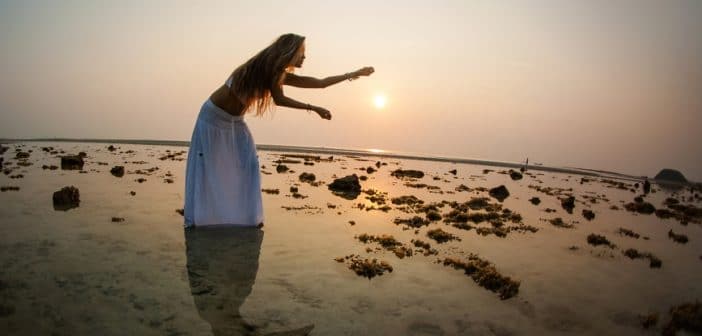This post was originally published on July 29, 2015.
“Have you heard of Ayahuasca?” Linda asks, leaning forward across the table, her voice low so the surrounding diners won’t hear.
“It’s a psychedelic right?” I reply. “I saw a CNN special about it.”
We’re at a restaurant in Brentwood that for over 25 years has been a popular spot among New Age types. It specializes in healthy food—quinoa, kale chips, gluten-free bread, Chia seed pudding, that sort of thing.
“It’s not a psychedelic,” Linda says, the word like dirt on her lips. “It’s a tool for transformation!”
“Hmm,” I think. “I meditate, I do yoga, I visit Esalen regularly. I’m all about transformation!”
“Tell me more,” I say.
Linda’s eyes gleam. “Ayahuasca’s made from a vine in the Amazon,” she begins. “When you take it— actually it’s called going on a journey—you get these deep soul revelations. The Ayahuasca, like, speaks to you. It’s life changing. You can accomplish in one night what would take you 10 years in traditional therapy.”
I feel a tickle of excitement in my chest. I want a soul revelation! I mean, I haven’t used drugs or alcohol for over 30 years, but this is different right? It’s a form of therapy. It’s a “journey,” not a trip. And really, my real problem was alcohol, not drugs. Well, there was that one time I did so much cocaine that I thought I was going to have a heart attack so I took three Quaaludes and drank vodka until my heart rate slowed down, then when it did, I did some more cocaine, but that was a one time thing! And even Bill Wilson, the co-founder of Alcoholics Anonymous, experimented with LSD back when it was used as a common modality in psychotherapy! Of course so were shock treatments (which are seeing a resurgence by the way) and lobotomies.
Linda goes on, “Ayahuasca has been producing fantastic medical results. Military veterans have been cured of PTSD, depressives have been able throw away their medications. And it’s not a drug, it’s natural.”
Ah, this argument sounds familiar. As a teenager in the 1970s, I did love my psychedelics. I dropped acid a couple of times but didn’t like it. The cheap street stuff I had access to was usually cut with speed so the high I got from it was edgy and crawly. Then I was turned on to Psilocybin, aka, magic mushrooms. You haven’t rocked out at a Yes or Emerson Lake and Palmer concert until you’ve done it on shrooms. Those laser shows! And hey! Mushrooms are natural! So I ate them once a week for the entire summer between my junior and senior year of high school. Along with smoking hash and weed every day, and enjoying Cokes spiked with Bacardi 151 in the evenings.
I take a desultory bite of my marinated tempeh salad with roasted yam croutons. Reality is beginning to sink in. Linda sips her Kombucha tea. She goes on, “I go to these retreats in San Francisco. They only cost $150 and include the guides, Harold and Mary. They’re amazing.”
“Harold and Mary? Those don’t sound like Peruvian names.”
“No, they’re not—they’re American. But they were trained by a Peruvian Shaman.”
“Oh, a Peruvian Shaman,” I repeat, trying to keep the ironic tone out of my voice. “So how many times have you done it?”
“I’ve done three journeys in the last six weeks. I’ve made so many discoveries about myself. I can’t wait to do it again.”
“Isn’t that, a lot of, um, journeying?” I ask.
“Peruvians have been using it for centuries. They take it, like, every day.”
“Why do they take it every day? I mean if it’s a tool for transformation, isn’t that excessive? Shouldn’t they have transformed? ”
Linda waves her hand dismissively, avoiding the question. “The point,” she says, “is they do it all the time; it’s totally safe.”
Safe? Maybe. But not for Kyle Nolan, an 18-year-old from Northern California, who was found dead after going on a journey at a retreat in Peru. And not, I’m forced to admit, for people like me. As evidenced by my youthful predictions, I could never trust myself to do “natural” drugs like Mescaline, Peyote, Psilocybin, Ayahuasca (all of which are Schedule I controlled substances) with impunity. I’d always want more.
In the words of philosopher Alan Watts, who in the 60s, at the height of the LSD movement helped bring Eastern ideas to the West, “Psychedelic experience is only a glimpse of genuine mystical insight…a glimpse which can be matured and deepened by the various ways of meditation in which drugs are no longer necessary or useful. If you get the message, hang up the phone. ”
People like me never hang up the phone. We put that number on speed dial.
I’m in my 50s now and attendant with my age are certain realities, mortality for one.
Earlier this year I visited an old friend in the VA hospital. He was a former homicide detective who prided himself on being a tough guy. (Of course that was an act; the man was a sweetheart.) He’d been free from drugs and alcohol for over 40 years and had helped hundreds if not thousands of people. He always had his hair and mustache perfectly groomed and sported a ubiquitous black Members Only jacket to keep himself looking good for the ladies.
When I visited him, he’d had a stroke that left him paralyzed from the neck down, and as if that weren’t enough, he also had cancer of the tongue, which left him unable to speak. Seeing my friend lying in that narrow hospital bed, inelegant and vulnerable in a pale blue open-backed hospital gown, the opposite of the dapper image he’d always aimed to present, was heartbreaking. I sat by his side for hours and told him how much I—and so many others—loved him. How much he meant to us. I know he heard me because he looked into my eyes the whole time I was there, tears occasionally running down his gaunt cheeks. Whether they were from gratitude or shame I’ll never know. We lost him a few months ago.
My beloved father has Alzheimer’s. He’s still at a stage where he can shower and shave and go to the bathroom by himself but other than that, he’s completely dependent on my mom. She has to remind him to eat, to take his medications, go to bed, wake up, dress, everything.
Last week, Mom got very sick with bronchitis. I got a call from the adult care center where my dad spends a few days a week, asking me to come pick him up. He’d been crying all day, begging to go home. When I arrived he rushed to me, his face drained of color. “Is my wife okay?” he cried.
I embraced him, patted his back. “Yes, Daddy, “ I said. “Don’t worry. She just has a bad cold.”
He broke into sobs. “Oh thank God, I was so worried, I love my wife so much!”
There I was on the sidewalk holding my weeping father, consoling him as if he were my own little child. Talk about a life changing experience.
If I’d been running off to San Francisco or Peru to take Ayahuasca for “insight” and personal “transformation,” I would have missed these moments: the honor of being present for a sick friend as he passes, the strength to be there for my father as he slips away. These painful yet precious drops of reality have “soul” changed me more than any drug-induced journey I took in my misspent youth. How glimmeringly beautiful life can be if you’re willing to be awake for it. It will reveal everything you need. No drugs, natural or otherwise required. Reality. What a trip.
I slurp down the last of my Acai berry infused iced green tea as our dreadlocked server, “Moon,” brings the check. Linda reaches for it.
“No, that’s okay,” I say. “I’ve got this.”
Sponsored DISCLAIMER: This is a paid advertisement for California Behavioral Health, LLC, a CA licensed substance abuse treatment provider and not a service provided by The Fix. Calls to this number are answered by CBH, free and without obligation to the consumer. No one who answers the call receives a fee based upon the consumer’s choice to enter treatment. For additional info on other treatment providers and options visit www.samhsa.gov.





